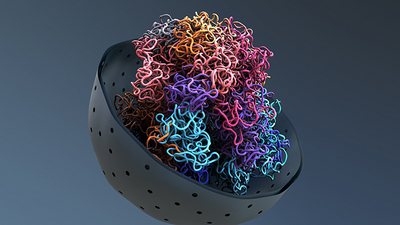TOP2 proteins regulate the folding of the human genome
The team of Prof. Vassilis Roukos at the Institute of Molecular Biology (IMB) in Mainz, Germany, has discovered that cells use proteins called type II topoisomerases (TOP2s) to regulate the three-dimensional folding of DNA in the nucleus. This is important for controlling gene expression and may also have important implications for how the cell prevents its DNA from becoming overtwisted and breaking. Their findings were published in the journal Molecular Cell.
The human genome encodes a vast amount of genetic information, comprising over three billion base pairs. If stretched out, the DNA inside a single cell would be approximately 2 m long. Yet, all of it must be contained within a cell nucleus only a few micrometres in diameter – meaning it must be compacted into a space more than a hundred thousand times smaller.
To achieve this, our DNA is folded into a series of chromatin loops, which helps compact and organise it into distinct domains. This 3D folded structure also keeps active and silent genes spatially separated from each other and is extremely important in regulating gene expression. Disrupting chromatin loops and the contact points between different DNA regions is known to cause developmental disorders, as well as diseases such as cancer.
Previously, Vassilis’ group and others discovered that proteins called type II topoisomerases (TOP2s) often bind to key contact points at the base of chromatin loops, called loop anchors. The main function of TOP2s is to relax and unknot the DNA when it is opened during replication and transcription. This prevents the DNA from becoming overtwisted or undertwisted (positively or negatively “supercoiled”), which can increase mechanical strain and cause it to break, or stall other essential cellular processes. Vassilis and his team also observed that chemotherapeutic drugs that trap TOP2s on the chromatin also often lead to the DNA breaking, promoting chromosome fusions that are associated with leukaemia (Gothe et al., 2019, Mol Cell).
This led them to suspect that the activities of TOP2 proteins may also have an important impact on the way chromatin is folded in the cell nucleus. To better understand the functions of TOP2 proteins, Vassilis’ team at IMB and the Medical School of the University of Patras (Greece) teamed up with the Papantonis (University Medical Center Göttingen) and Mundlos (Max Planck Institute for Molecular Genetics, Berlin) labs to profile chromatin contact points across the entire genome of human cells with and without TOP2s. Moreover, to profile positive DNA supercoiling across the genome, he and his team developed a new next-generation sequencing technique called GapRUN, which uses a protein called GapR that binds specifically to overtwisted DNA. This was the first time that DNA supercoiling had been mapped across the entire genome of human cells.
When the researchers depleted TOP2s, they noticed hundreds of new chromatin interactions appearing that involved highly positively supercoiled regions. Notably, these interactions very often occurred at the boundaries between highly transcribed regions and sections of the DNA that were anchored to the nuclear lamina (known as lamina-associated domains, or LADs). These changes were also accompanied by genome-wide gains and losses of LADs, as well as changes in gene expression.
The researchers believe these results demonstrate that TOP2s are important for preventing chromatin within LADs from interacting with active chromatin across the LAD boundary. Vassilis speculates that supercoiling from transcriptionally active regions could accumulate at LAD boundaries, making DNA more prone to break at these key locations. Preventing chromatin interactions between LADs and non-LAD regions may also help keep them distinct and organised within the nucleus. “Our work argues for a moderate, yet direct involvement of TOP2s in remodelling chromosome organisation,” Vassilis says. “In future, we plan to assess how TOP2-dependent remodelling of DNA supercoiling might help prevent genomic instability, which is an important step in the development of certain types of cancer”.
Further details
Further information can be found at https://www.sciencedirect.com/science/article/pii/S109727652400830X?via%3Dihub.
Vassilis Roukos is an Affiliated Group Leader at the Institute of Molecular Biology (IMB). Further information about research in the Roukos lab can be found at www.imb.de/roukos.
About the Institute of Molecular Biology gGmbH
The Institute of Molecular Biology gGmbH (IMB) is a centre of excellence in the life sciences that was established in 2011 on the campus of Johannes Gutenberg University Mainz (JGU). Research at IMB focuses on the cutting-edge fields of epigenetics, genome stability, ageing and RNA biology. The institute is a prime example of successful collaboration between a private foundation and government: The Boehringer Ingelheim Foundation has committed 154 million euros to be disbursed from 2009 until 2027 to cover the operating costs of research at IMB. The State of Rhineland-Palatinate has provided approximately 50 million euros for the construction of a state-of-the-art building and is giving a further 52 million in core funding from 2020 until 2027. For more information about IMB, please visit: www.imb.de.
Boehringer Ingelheim Foundation
The Boehringer Ingelheim Foundation is an independent, non-profit organization that is committed to the promotion of the medical, biological, chemical, and pharmaceutical sciences. It was established in 1977 by Hubertus Liebrecht (1931–1991), a member of the shareholder family of the Boehringer Ingelheim company. Through its funding programmes Exploration Grants, Plus 3, and Rise up!, the Foundation supports excellent scientists during critical stages of their careers. It also endows the international Heinrich Wieland Prize, as well as awards for up-and-coming scientists in Germany. In addition, the Foundation funds institutional projects such as the Vienna-based AITHYRA institute combining AI and Biomedicine, the Institute of Molecular Biology (IMB) and the European Molecular Biology Laboratory (EMBL), both in Germany.
Press contact for further information
Dr Ralf Dahm, Director of Scientific Management
Institute of Molecular Biology gGmbH (IMB), Ackermannweg 4, 55128 Mainz, Germany
Phone: +49 (0) 6131 39 21455, Email: press(at)imb.de
